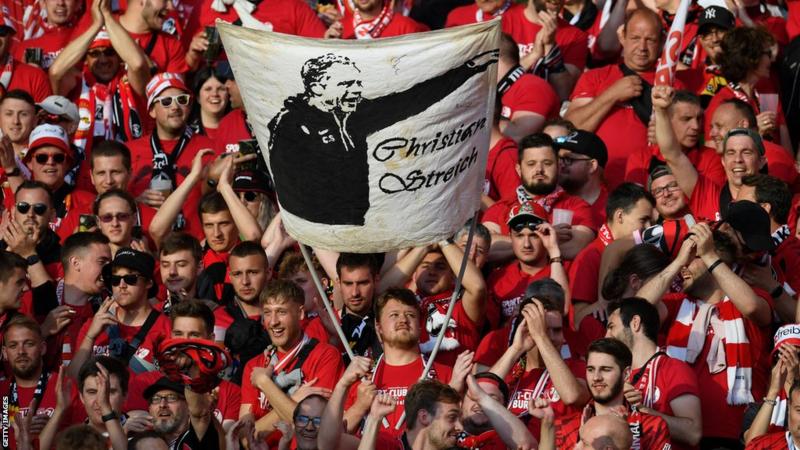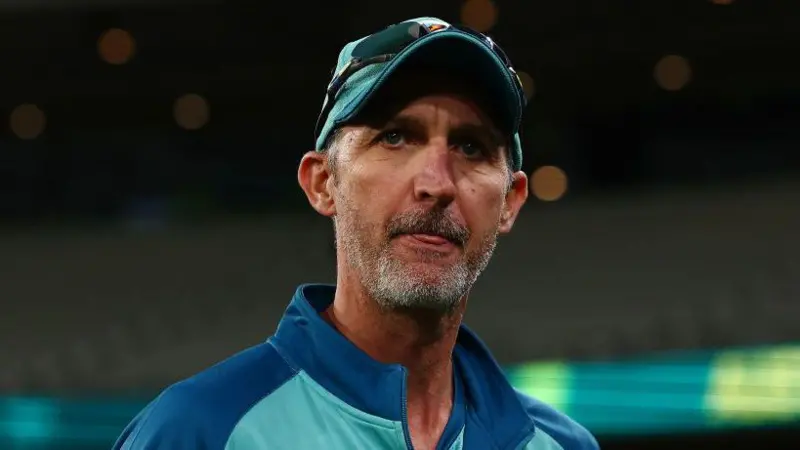Christian Streich: The skinny-dipping managerial maverick shaking up the Bundesliga
As his team sealed a 2-0 victory over Cologne in November, Christian Streich's eyes pricked with tears.

He dabbed at them as he stared out at the pitch, then turned, punched the air and hugged each of his fellow coaches.
Note, 'fellow coaches'. This is an important point to Streich. Those alongside him in the Freiburg dugout are not his coaching staff or assistants.
Streich - nominally the head coach - insists they have played an equal and important part in Freiburg's achievement, and should be recognised as such.
The win over Cologne had taken the long-time relegation battlers from one of Germany's Black Forest backwaters, to second in the Bundesliga, just a point behind 10-time defending champions Bayern Munich.
After the game, reporters constantly questioned Streich about his emotions.
"It was just the wind in my eyes," he said.
No-one was convinced.
His team are on the move. And they are moving Streich and a whole city in the process.
In September 2021, after Freiburg played their final game at their much-loved but outdated Dreisamstadion, he clambered into the north stand, took a megaphone from the ultras and led them in an emotional lament.
In May, as he stood in front of 20,000 fans and thanked them for their support during a gut-wrenching shoot-out DFB Cup final defeat by Leipzig, his eyes glistened once again.
Announcing his latest contract extension, the 57-year-old choked up when asked what the club and their show of faith meant to him.
Streich is perhaps the Bundesliga's most emotional coach. He is a combustible, cantankerous touchline presence, roaring on his team and occasionally berating officials and opposition.
The tears are not usual. But then these are not usual times in his 28-year relationship with the club either.
This weekend, the Bundesliga restarts with upstarts Freiburg still in second, pushing into unknown territory.
The rise of a club that has spent six seasons in the second tier since the turn of the millennium has been steady, but consistent.
There is no big financial backing from a German corporate giant or an overseas billionaire.
It is a world away from the 373m euros (£331m) that Bayern plough into their squad.
But Freiburg have two advantages over the bigger spenders.
The first is continuity. Most of those in the boardroom have been there for decades.
Sporting director Klemens Hartenbach is one of the shorter serving, having been in position for 15 years. He and Streich shared a flat in the 1980s, where they listened to the Beatles and cooked together.
In the dressing room, the players spend an average of almost five years at the club, a slower turnover than everywhere else in the German top flight. There is a sense of familiarity and family around the club.
The other advantage is Streich himself.
His managerial qualities are obvious. He polishes young players and produces teams that consistently punch above their weight.
Dennis Aogo is typical of his work.
Aogo arrived at Freiburg as a raw 15-year-old back in 2002, when Streich was still a youth coach at the club.
"Without Christian Streich, I wouldn't have become a professional football player," Aogo says about his former coach, the gratitude clear in his voice.
"I would have gone off the rails.
"Three years before my breakthrough, I was at a crossroads. In the Freiburg academy, players got fired once they had got three warnings.
"I was allowed to stay although I had way more than three. There were parties, fights, skipping school, staying out late - the typical stuff you do as a teenager.
"But you can't do that when you want to become a professional."
As Aogo put it, Streich and Stefanie von Mertens, then head of the academy, saw something in him.
"They got me into line. The worst thing was when I wasn't allowed to train," he added.
"Streich put me on a diet, I had to reduce my weight by half a kilo per week and had to do extra running with the athletic coach."
Streich's regime sparked an obsession with becoming a professional. Aogo trained on his own and cycled to the training camp to watch the first team's training sessions.
Aogo realised his ambition, playing 257 games in the Bundesliga for Freiburg, Hamburg, Schalke and Stuttgart, making 12 Champions League appearances and winning 12 international caps for Germany, one of which came at the 2010 World Cup.
Since then many more people have come to know Streich. His quirky charisma and everyman charm has made him one of the most popular figures in German football.
Streich still speaks in his distinctive hometown dialect of Alemannisch, rather than the standard German of the big cities. He wears a casual jumper and jeans, rather than any expensive designer clothes.
When he was sidelined for October's Europa League match against Nantes after testing positive for coronavirus, Streich had to ask around if he could watch the game on free-to-air television or if he needed to subscribe to another channel.
"If so, I'll have to find somebody who can install it for me," he said.
In December 2021, there was more inconvenience. An away game against Borussia Monchengladbach was moved to a Sunday, leaving Streich, who had tickets to a concert by guitar virtuoso Marc Ribot, bitterly disappointed.
"I wouldn't have given away those tickets for the Champions League final or any money in the world," he said. "I was genuinely annoyed when I heard the date of our game."
His players did their best to make it up to their manager, scoring all six goals in a 6-0 thrashing of Monchengladbach in the first half.
When the German top flight paused this winter, he did not travel to the usual footballer destinations of Dubai or Majorca; instead he took in the culture of Morocco. In his younger days, he would set off with little more than a backpack and the vaguest itinerary.
"I love to meet new people, I am not afraid to go anywhere unknown," he said when asked about his trips.
A return to normality and privacy, an escape from his increasingly high profile, is also part of the attraction.
In the beginning of his 11-year stint as Freiburg manager, he underestimated how recognisable he had become.
Touring his home country on his bike, he happened upon a picturesque little beach. Only as he made his way down from the road, did he realise it was a nudist area.
Streich's reaction was not to retreat, but instead to whip off his clothes and dive into the water. As he emerged, one of his friends quietly reminded him that he was only a furtive cameraphone shot from going viral.
It is easy to forget about such dangers in Freiburg.
The town - population a little over 200,000 - has a tendency of leaving stars alone. Players can party after games without being photographed.
Streich, on foot or on bicycle, is also familiar sight in the streets. Many locals have their own stories of standing next to him at the bar, sharing a cigarette or enjoying concerts with him.
When BBC Sport asked one of his favourite bars, a lively pub which stages gigs, book readings and football screenings, about Streich, they were not interested in any publicity.
"He comes here in his private time and we don't want that to be a topic out in the open," they replied via email.
Make that same request in Munich, and the bar owners might have given you the exact dates and drinks of the VIPs they serve.
But, in Freiburg the connection between the club, city, and its culture is more precious.
So to understand Streich, you have to stroll through Freiburg.
On a sunny winter's day in January, the pavement cafes are packed.
Pretty shop fronts face out on to the Dreisam river in the old town. Residents leave out a selection of books for passers-by to browse as they stop and take in the view.
It's an attractive city - travel guide publisher Lonely Planet ranked it third as on a list of place to visit in 2022 - but many Germans have wondered if Streich could be tempted away.
Teams such as Schalke, Bremen and Monchengladbach have reportedly made pitches to him.
Streich is said to have pondered each for a while but, in the end, always opted to stay.
Former Bayern Munich president Uli Hoeness said even the perennial German champions once had him in mind as a manager.
"That is not realistic, I couldn't train Bayern Munich," Streich told local broadcaster SWR, as he reflected on scrutiny and pressure that would come on a bigger stage.
"I would be a has-been after four weeks."
So will he ever move on?
"No chance. Elsewhere they would have to engage an interpreter as well," jokes Kurt, who sports a white beard and a black beret, as he sits in the Come Inn Sport Bar.
Next to Kurt sits Timo, an IT worker with his dog at his feet and a beer in hand.
The bar around them is decorated with Freiburg scarves and pictures of players. Its two television screens show a friendly Freiburg are playing during their mid-season training camp.
-bbc







